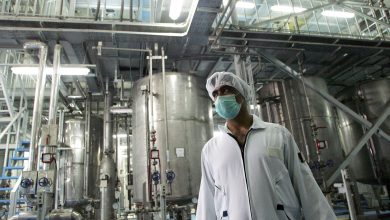Two Decades After 9/11 Inquiry, a Similar Plan for Covid Stalls in Congress
WASHINGTON — The nation was reeling from an unfathomable number of deaths. Politicians were pointing fingers, asking why the United States had been so ill-prepared for a lethal threat. Congress, defying the White House, ordered an independent investigation.
That was 20 years ago, and what came of it was a national reckoning. A bipartisan panel investigating the Sept. 11, 2001, terrorist attacks held televised hearings, developed 41 recommendations for how to improve national security and produced a best-selling book — a gripping historical narrative about what had gone wrong.
Now the United States is climbing out of a different crisis, the coronavirus pandemic, which has killed vastly more people than the Sept. 11 attacks and set off a global economic crisis. But some experts in biodefense and public health fear that the opportunity for a national reckoning with Covid-19 is slipping away — and with it, a chance to build on lessons learned during the pandemic.
Bipartisan legislation to create a Sept. 11-style independent panel to investigate the government’s pandemic response appears stalled on Capitol Hill, despite a 20-to-2 vote in favor of the measure by the Senate health committee. Backers say their last hope for passage is to tack it onto an upcoming spending bill, the final major must-pass piece of legislation of the current Congress.
The commission would be created as part of a sprawling bill called the PREVENT Pandemics Act. The measure would also make the director of the Centers for Disease Control and Prevention a Senate-confirmed position and take other steps to improve pandemic preparedness, including increasing coordination among public health agencies and addressing supply chain deficiencies.
There has been no vocal opposition to the bill, but it has been in limbo since it passed the health committee in March — a victim of inertia and other legislative priorities.
There is no companion measure in the House, where Republicans are planning their own pandemic-related investigations once they take control of the chamber next month. Perhaps more significantly, President Biden has not taken a position on the bill. Senator Chuck Schumer of New York, the majority leader, who has focused his efforts on judicial nominations and the president’s agenda, has not brought it up for a floor vote. Mr. Schumer’s office and the White House declined to comment.
One of the bill’s two chief sponsors, Senator Patty Murray, Democrat of Washington and the chairwoman of the health committee, made an impassioned appeal for it on the Senate floor last week. In an interview, she said the White House was “well aware” of her efforts.
“This is a bill that we needed both Republicans and Democrats on,” she said. “They understand that.”
Read More on the Coronavirus Pandemic
- Updated Shots: The Food and Drug Administration expanded eligibility for the updated coronavirus boosters to children as young as 6 months old.
- Plummeting Demand: A key partner of Covax, the organization leading efforts to bring Covid vaccines to poor and middle-income countries, will stop supplying the shots to a huge part of the global population in 2023.
- Pregnant Women: Even though studies have shown that the Covid vaccine is safe for expectant women, many have avoided getting the shots, unaware of the risks that the virus poses.
- Pandemic Response: A report by Senate Democrats on how the U.S. government bungled its early pandemic response faulted the Trump administration as well as pre-existing systemic problems.
More than a million Americans have died of Covid-19 — over 300 times the number that perished on Sept. 11. With cases and hospitalizations once again rising, more than 450 Americans are still dying of Covid each day. Over 200,000 children have lost a parent or a caregiver, and the C.D.C. estimates that millions of adults have long Covid, a constellation of lasting symptoms.
The idea for a commission has been percolating for nearly two years, backed by members of Congress, advocacy groups representing the bereaved and the former executive director of the 9/11 Commission. Experts say that beyond charting a blueprint for confronting future pandemics, an independent panel — with the power to issue subpoenas and convene public hearings — would serve as a form of catharsis for the country and a way to comfort those who lost loved ones.
It might also answer a pressing question: Why does the United States have a higher death rate from Covid-19 than other wealthy nations?
“Although much of the country is acting like the pandemic is over, the hurt and the anger and the pain and the way lives have changed is still with people every day,” said Dr. Nicole Lurie, a top official with the Coalition for Epidemic Preparedness Innovations, a global nonprofit. “If a commission can really start to grapple with questions about how does our country heal, and what do leaders do to get on a path to that healing, that would be an important contribution.”
Any investigation of the pandemic would necessarily be vast and complex, encompassing topics such as better detection of new pathogens, improvements to the public health system’s antiquated data collection apparatus, supply chain vulnerabilities, the harmful effect of lockdowns on many schoolchildren, the spread of misinformation and a lack of public trust in agencies like the C.D.C.
Members of Congress have tried to examine the crisis. On Friday, the House subcommittee on the coronavirus crisis released its final report, which was sharply critical of the Trump administration. On Thursday, Democrats on the Senate homeland security committee issued a study of the pandemic’s early months. In October, Republicans on the Senate health committee released an examination of the pandemic’s origins that suggested it was the result of a lab leak — a view most scientists disagree with.
But those inquiries are partisan. The bill to create the independent commission would establish a 12-member expert panel of “highly qualified citizens” appointed by congressional leaders from both parties. Like the Sept. 11 panel, it would have subpoena power and hold public hearings. It would be charged with examining the origins of the pandemic as well as the response by the Trump and Biden administrations.
“There’s no substitute for showing the vision that we showed in the early 2000s at creating an architecture that fixes things that we got wrong then, that addresses things that we didn’t think of then that we’ve learned, having gone through it,” said Senator Richard M. Burr of North Carolina, the health committee’s top Republican, who is sponsoring the measure with Ms. Murray.
Some experts see a broad-based examination of the pandemic as too daunting. And even if a commission were established, it might have difficulty overcoming the intense partisanship surrounding Covid-19. The nation was so deeply divided after Sept. 11 that “partisan pressures almost tore apart our commission,” said Philip D. Zelikow, a University of Virginia historian and former government official who was the executive director of the Sept. 11 panel. The problem is even worse today, he said.
Mr. Zelikow now leads the Covid Commission Planning Group, a privately funded effort involving about three dozen independent experts who have spent the better part of the past two years conducting research to lay the groundwork for a national inquiry. The group, which has held several hundred interviews, grew tired of waiting for Congress and plans to publish its findings in a book this spring, Mr. Zelikow said. He declined to discuss details.
Infectious disease experts predict that pandemics will occur with increasing frequency, fueled by global travel, climate change and humans moving into closer proximity with animals. Biodefense experts say that pandemics are every bit as big a threat to national security as terrorist attacks. But the public may not see it that way.
“Nine-eleven was a national convulsion that was shared with varying intensity across the country, and everybody basically agreed it was shocking and terrible,” said Tara O’Toole, a former official in the Homeland Security Department who is a senior fellow at In-Q-Tel, a venture fund backed by the C.I.A. “Epidemics are not lights-and-sirens events.”
Advocacy groups like Marked by Covid and Covid Survivors for Change have been lobbying Congress to create an investigative commission, just as the Sept. 11 families did in the aftermath of the attacks. To some people grieving losses from Covid-19, the notion that Congress may fail to act feels like a slap in the face.
“I am not looking for a commission to blame people,” said Pamela Addison, who has been raising two young children alone since her husband, a health care worker, died early in the pandemic. “I just want a commission to look into what went wrong so this can be prevented, and I feel it would give me some closure knowing what happened and why.”
Various organizations, including the Commonwealth Fund and the Center for Strategic and International Studies, have also tried to issue blueprints for pandemic prevention. The Biden White House recently published an updated national biodefense strategy and is asking Congress for $88 billion over five years to fund pandemic prevention, but there has been no movement on that request.
But those efforts are not the same as a high-profile panel that has “the imprimatur of Congress and the White House,” said Joseph I. Lieberman, the former Connecticut senator who sponsored the bill that created the Sept. 11 panel, which passed in November 2002. Mr. Lieberman, who is now a chairman of a nonprofit devoted to biodefense, called on Mr. Biden to back the effort.
Some lessons from the pandemic are already clear. Scientists figured out how to fast-track the development of tests and vaccines. The C.D.C. established a new program to detect the coronavirus in wastewater. Public health officials learned how to use masks and better air quality systems to control the spread of respiratory viruses.
Experts are trying to build on those lessons. The Coalition for Epidemic Preparedness Innovations is seeking to raise $3.5 billion for a plan to create and scale up manufacturing of a vaccine within 100 days of the emergence of a new pathogen, a goal shared by the Biden administration. The C.D.C. is reorganizing in response to what its director, Dr. Rochelle Walensky, has described as “some pretty dramatic, pretty public mistakes” in its pandemic response.
But no one is putting it all together, and Mr. Zelikow says time is growing short. The pandemic is already almost three years old. Important facts may be lost with the passage of time — in part, he surmises, because politicians and the public mistakenly believe that nothing can be done to avert a future crisis.
“People in both parties, and Americans in general, have no idea what to do about pandemic danger, and therefore they become naturally resigned to thinking about it fatalistically, as a condition they have to bear,” he said. “This is the giant hole, the gaping crater in our discourse about the pandemic.”
Emily Cochrane contributed reporting.



